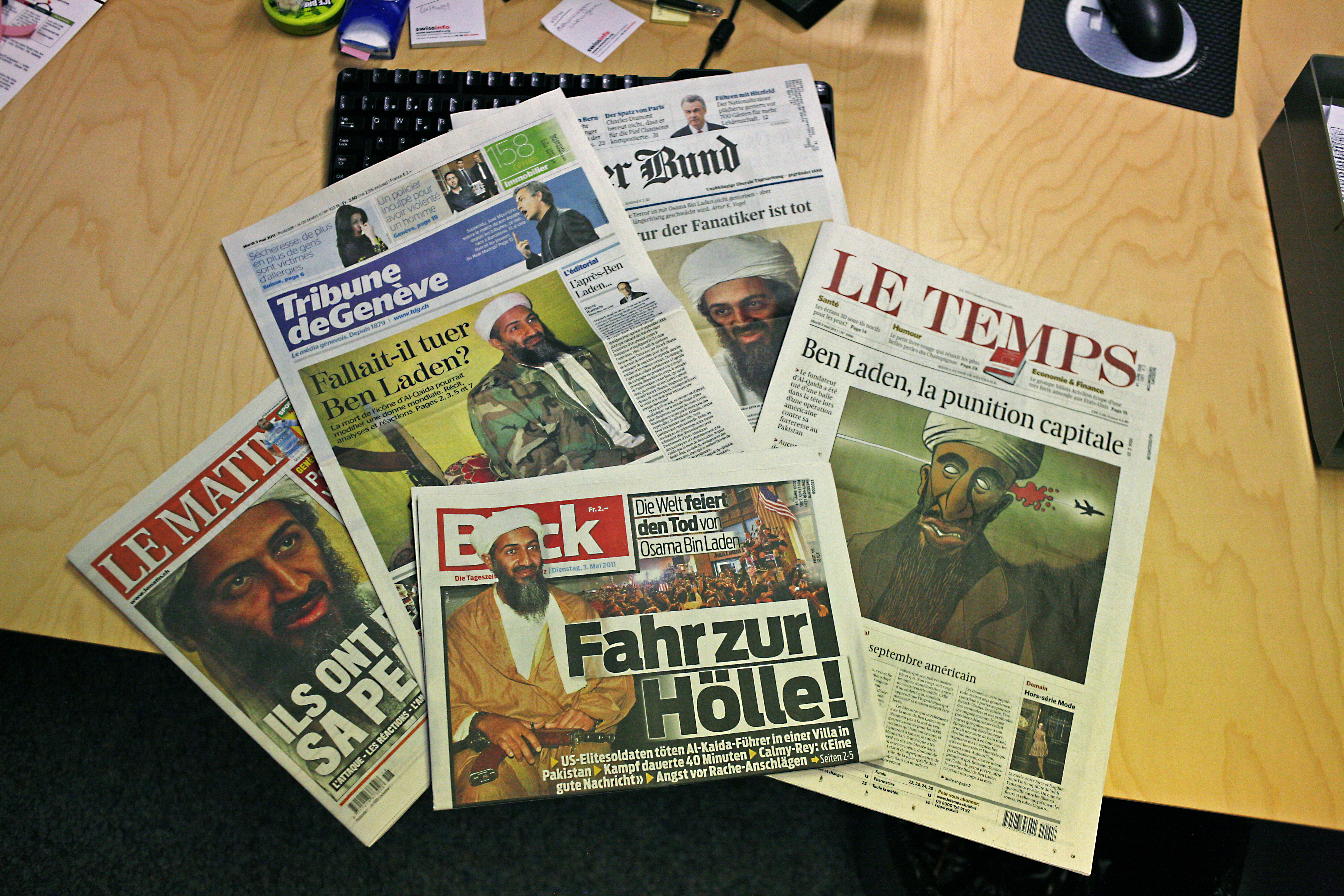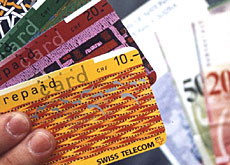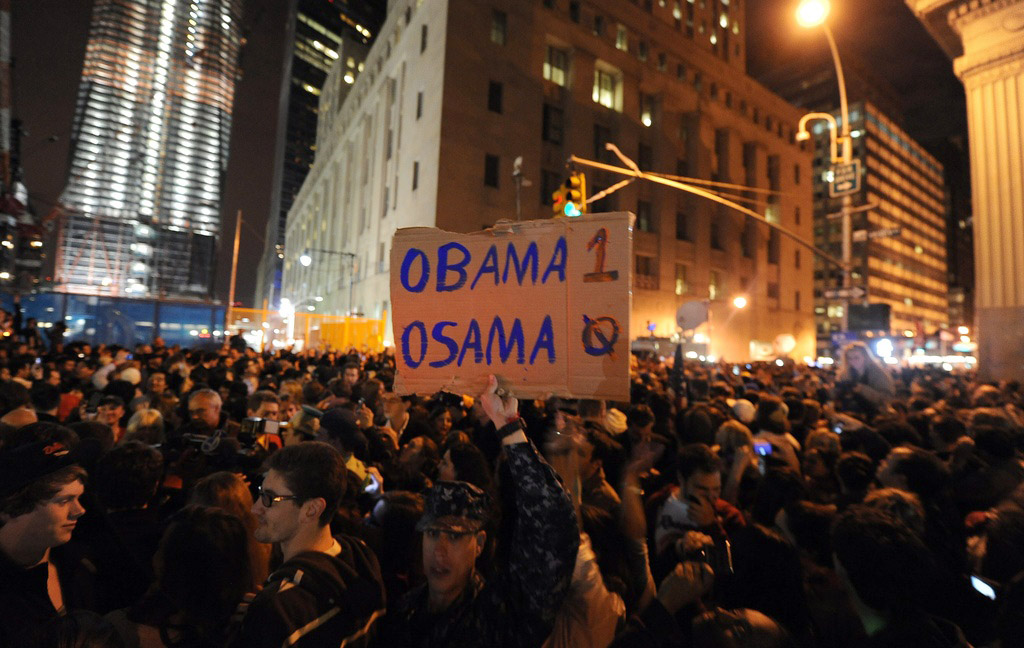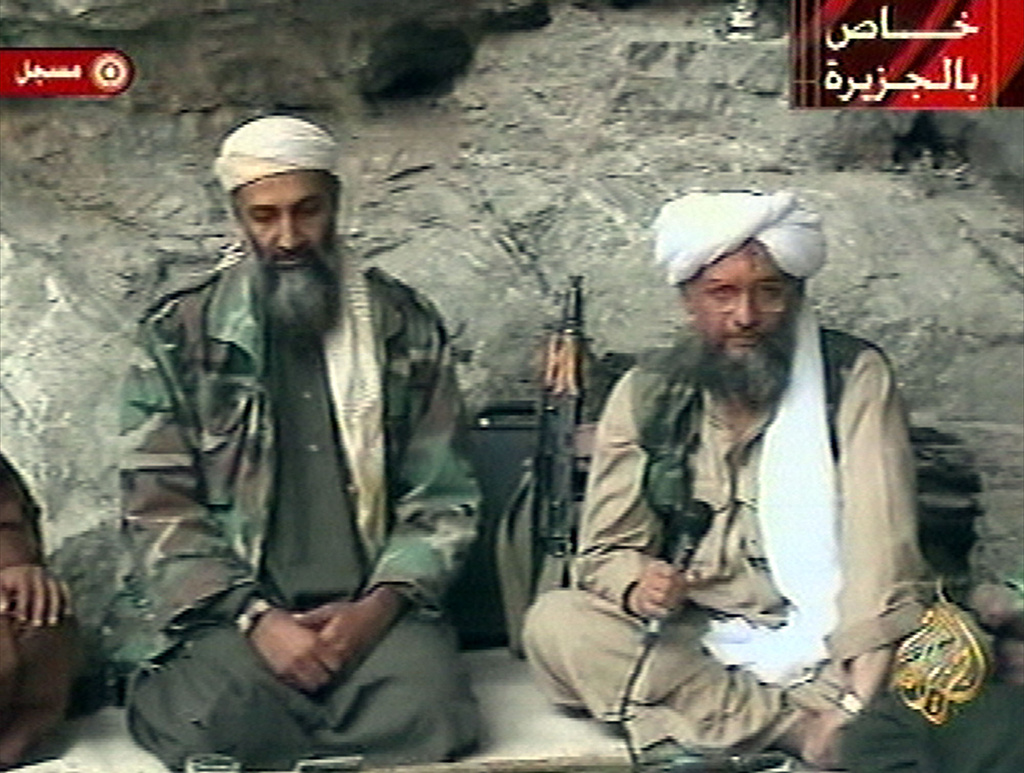Swiss press weigh up bin Laden legacy

Swiss newspapers have all welcomed the death of Osama bin Laden, but they also warn that the battle against Islamic terrorism is far from won and his “brand” lives on.
“Prince of terror”, “icon”, “monster”, “martyr” – editorialists across the country had no problem describing the leader of Islamist terror network Al-Qaeda, killed by United States special forces on Sunday. They were less sure what his death would mean for global geopolitics.
“For the United States it’s finally September 12,” declared Le Temps in Geneva. “It’s taken ten years, but today one can fully take into account the obsessions, pessimism and paralysis that accompanied that decade.”
The US, it said, lived those years wounded, doubting its status as a superpower and its role in a changing world – doubts which played a large part in bringing Barack Obama to power.
“Announcing the success of an operation against a person whom the US considered evil incarnate, Obama kept the victory modest. But he implied the emergence of a new era for his country. The timing is favourable not only from an internal point of view, but also, significantly, facing an Arab world which didn’t wait for the removal of bin Laden to initiate one of its greatest changes.”
“Franchises to murder”
The tabloid Blick said the Saudi-born “prince of terror” lived in the Middle Ages and the present at the same time, demanding people follow 1,400-year-old rules which he spread with the very latest technology and marketing principles.
It said Bin Laden handed out “franchises to murder” like McDonald’s did burgers, with the result that autonomous Al-Qaeda cells had established themselves from Saudi Arabia to Indonesia.
“The bin Laden brand thus survives its creator – Islamic terror has not yet been defeated.”
Zurich’s Tages-Anzeiger also highlighted the power of bin Laden’s image. “The end of an icon” was its front-page headline.
But although his “twisted ideology” would live on and enough groups existed to continue his bloody work, the paper believed that without bin Laden the Al-Qaeda network lacked its “inspirational icon”, which “should make recruiting new followers harder”.
The Tages-Anzeiger also pointed out that al-Qaeda had lost the hearts of most Muslims a long time ago. “Bin Laden had failed to realise that people in the Islamic world want change, but they don’t dream of holy wars or living as one did during the time of Mohammad. They want freedom, equal opportunity, respect and dignity”.
Continuing threat
The Neue Zürcher Zeitung agreed, saying the death of the man who triggered wars in Afghanistan and Iraq with the September 11 attacks was a “break” not only for Washington. It warned, however, that terrorism remained “virulent” – especially in Europe.
“Jihadism continues to be a danger,” it said. “After bin Laden’s death, organisations close to Al-Qaeda will try more than ever to carry out attacks not only in Pakistan but also in the West.”
It highlighted the problem of “home-grown terrorism”, the radicalisation of converts or second-generation Muslim migrants in the West. “Bin Laden’s seed has been sown,” it said.
Der Bund in the Swiss capital Bern was more optimistic, saying that although Islamist terror had not died along with bin Laden, there was hope that it had been weakened in the long term.
“Al-Qaeda exists without bin Laden … nevertheless the leading figure of Islamist extremists, their symbol, has been eliminated and a motivating factor has been removed.”
Die Südostschweiz saw a danger of bin Laden still exerting an effect as a martyr. “The world is now free of the monster that was bin Laden – it is not free of the monster of religious fanaticism.”
Conspiracy theories
The French-speaking newspapers largely agreed, although the Tribune de Genève’s front page led with the question: “Was it necessary to kill bin Laden?”
Its editorialist pointed out that while it took days for conspiracy theories to start circulating after September 11 – denying the attack on the Pentagon or implying CIA involvement – only hours were needed for theories to appear after the death of bin Laden.
“From the timing of the operation, which was perfect for the president’s election campaign, to the (too?) quick removal of the body [reportedly buried at sea], the intervention doesn’t sound right. What could bin Laden have revealed had he been captured alive?”
Despite that, the paper saw a real hope for change. “Tomorrow, Barack Obama, rid of the terrorising icon of bin Laden, has the opportunity to start again with a constructive foreign policy, more nuanced and less ideological [than that of George W Bush]. That would be a great victory over Al-Qaeda.”
US President Barack Obama described the operation as, “the most significant achievement to date in our nation’s effort to defeat al-Qaeda. Yet his death does not mark the end of our effort. There’s no doubt that al-Qaeda will continue to pursue attacks against us”.
The New York mayor, Michael Bloomberg, has said he hopes the news will “bring some closure and comfort to all those who lost loved ones on September 11, 2001”.
Former President George Bush described the death a “momentous achievement” which marks “a victory for America”.
Afghan President Hamid Karzai said bin Laden had “paid for his actions”.
A Pakistani government statement said bin Laden’s death “illustrates the resolve of the international community, including Pakistan, to fight and eliminate terrorism”.
The Palestinian Islamist group Hamas condemned the killing and mourned bin Laden as an “Arab holy warrior”.
President and Foreign Minister Micheline Calmy-Rey welcomed the news of bin Laden’s death.
She said Switzerland condemned all kinds of terrorism and was in favour of actions aimed at putting an end to international terrorism.
“My thoughts are with all the victims [of international terrorism] and their families,” she said.
Calmy-Rey is currently in Tunisia where she is meeting Swiss ambassadors to North African and Middle Eastern countries.
Defence Minister Ueli Maurer says Switzerland is not a prime target of Islamic terrorists, but he would not exclude attacks.

In compliance with the JTI standards
More: SWI swissinfo.ch certified by the Journalism Trust Initiative





You can find an overview of ongoing debates with our journalists here. Please join us!
If you want to start a conversation about a topic raised in this article or want to report factual errors, email us at english@swissinfo.ch.